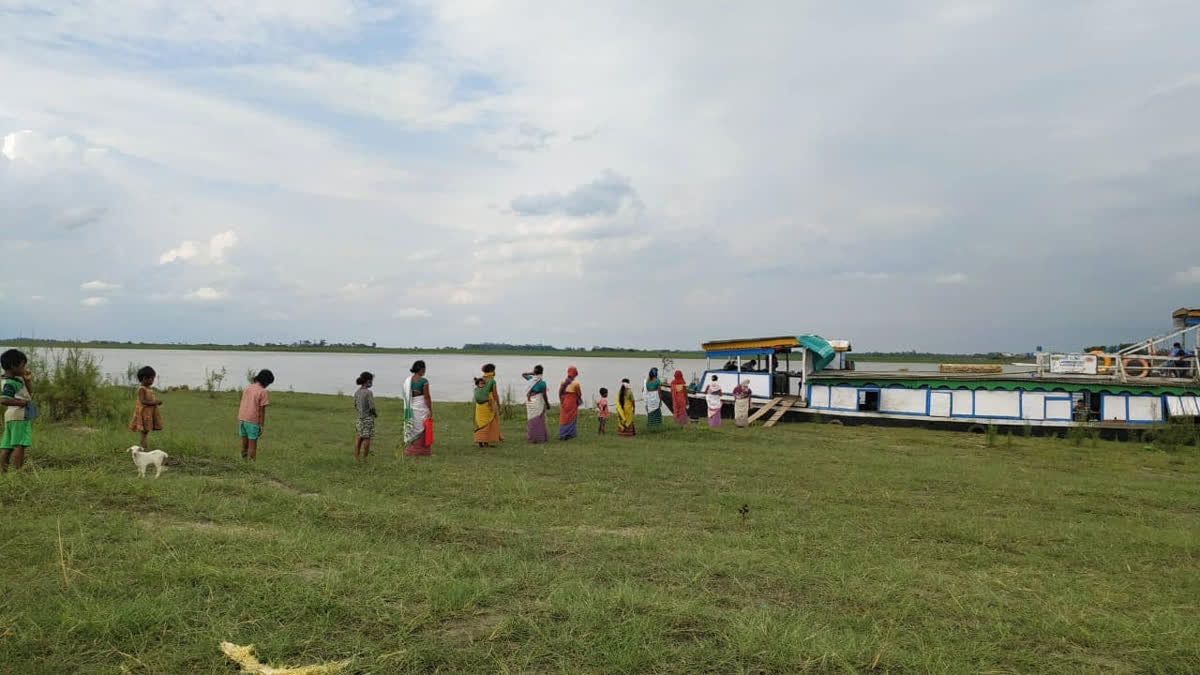Morigaon: As the noise of silence rented the air around the pristine Brahmaputra waters, 75-year-old Mainul Haque stood on the sandy banks, clutching his shawl tightly against the biting December chill. His gaze was stretching to catch a glimpse of the boat clinic, that would give him the healing touch - from breathing issues to rising blood pressure and sugar concerns. For Mainul and countless others on Chitalmari char, this wasn’t just a boat, it was their only hope to keep well.
Mainul, is a marginal farmer who lives in Chitalmari char in Central Assam's Morigaon district, was accompanied by his son Rafikul Haque, also a farmer and father of three. He too waited to get a check-up on his skin infections.
Boat Clinic That Floats Across Brahmaputra To Render Healthcare In Assam’s Sandbars (ETV Bharat) Apart from Mainul and his son, several other residents were also waiting for the boat clinic, aptly named Akha or 'hope' in Assamese, which are the only hope for most of the char dwellers in Assam for all their health needs.
The chars and chaporis are sandbars scattered across Assam’s river systems and home to around 2.5 million people, predominantly marginalized farmers. These remote islands, spanning 3.6 lakh hectares, remain cut off from development, lacking roads, schools, and healthcare facilities. Here, the basic act of accessing healthcare is a costly, arduous journey.
Launched in 2005 by the Centre for North East Studies and Policy Research (C-NES) and later integrated into the National Health Mission (NHM), the boat clinics were conceived to bridge this gap. These floating clinics navigate the mighty Brahmaputra and its tributaries, delivering essential healthcare services to remote char communities.
Children posing with a boat clinic or Akha (ETV Bharat) “In Morigaon district alone, one boat clinic caters to 22 char villages with a population of over 10,300,” explains Shyamjit, District Programme Officer of the Akha boat clinic. “We visit each village at least once a month, providing routine check-ups, immunizations, and medicines. Our health workers coordinate with local networks to inform residents of our arrival.”
Each boat clinic is equipped with doctors, nurses, and health workers who conduct health camps tailored to the needs of the community. In cases requiring advanced care, patients are referred to district hospitals.
Health team walk with medicines (ETV Bharat) “All patient data is documented and integrated into the NHM system,” Shyamjit adds. This ensures a systematic approach to tracking health outcomes and planning interventions.
For residents like Mainul, the boat clinics are indispensable. “Traveling to the nearest town is not an option for us,” he says. “Hiring a boat is expensive, something most of us cannot afford. So the boat clinic is the only hope for us," said Mainul Haque.
Bhaswati Goswami, Communications Officer at C-NES, speaks on the objective of the initiative. “The boat clinics aim to reduce maternal mortality and infant mortality rates by delivering healthcare to inaccessible riverine areas. Since its inception, the project has reached over 4 million people in 15 districts of Assam,” she says.
Lack of basic health care facilities often force residents to carry patients on cot or sling (ETV Bharat) The teams, comprising 15 members, including doctors, nurses, pharmacists, and lab technicians, focus primarily on maternal and child health. “Our goal is to encourage institutional deliveries,” says Goswami. “While many women still deliver at home, awareness about safe practices is growing.”
The boat clinics also educate char residents on hygiene, sanitation, and government welfare schemes. With limited awareness about these issues, the char dwellers face additional challenges, compounded by climate change.
The problems of the char dwellers in Assam are compounded due to unpredictable weather conditions. Temperature, erratic unpredictable rainfall patterns and increasing flood intensity have started making impact on the marginalized population who lead life on the edge.
“Unpredictable weather patterns, erratic rainfall, and intense flooding have worsened living conditions for these vulnerable communities,” observes Nimisha Bhuyan, a researcher studying boat clinics in Assam’s Dhubri district. “While the clinics provide crucial support, their limited frequency underscores the need for expansion.”
In Dhubri district alone, where there are 400 chars, the challenges are immense. Bhuyan notes, “Lack of basic hygiene awareness impacts health issues in a big way. However, the clinics are making a difference, one visit at a time.”
As the boat clinic docks on Chitalmari char, residents gather, their faces a mix of relief and hope. For Mainul Haque and countless others, Akha is not just a boat—it’s a promise of a healthier, more secure tomorrow.
Read more
